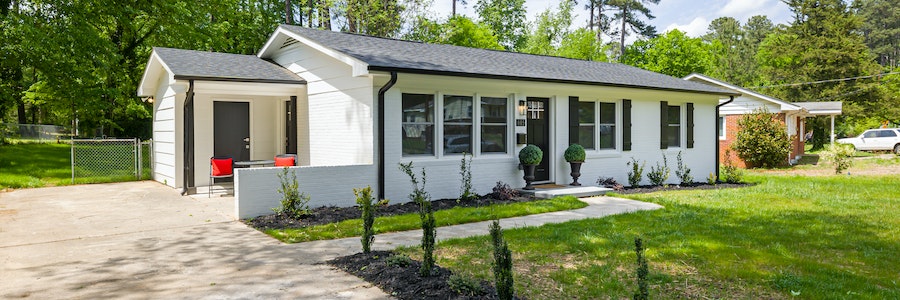- Walk-in Traffic is by Appointment Only - More Details
Why New York Investors Are Looking To Charlotte Real Estate

Real Estate Investing Strategies
August 20, 2022
What Should A Property Management Agreement Include?
September 6, 2022Charlotte’s Booming Investment Opportunities
Charlotte, North Carolina, was recently ranked 15th among the nation’s hottest markets according to data from Realtor.com, and that ranking has come true in grand fashion.
Real estate specialists have great hopes for the future of the city. According to a recent analysis of real estate trends, Charlotte is well-liked by both investors and developers. The survey also lauded it for being a “magnet” among “18-hour cities,” so termed because they have a bustling downtown after regular business hours of 9 to 5.
Consider the following data from Realtor.com:
- The median listing price of a Charlotte home in April 2022 was $400,000—an increase of 12% over the previous year.
- Likewise, April’s median sold property price increased by 21% from the prior year to $401,700.
- As of June 2022, the typical home sells for around 4% more than the asking price.
- Thirty-five days are the average days on the market, down from 39 days last year.
Since their most recent historical lows of roughly 3%, mortgage rates nationally have increased near 5%, and the short-term market is currently stagnant. On the other hand, over time, demand in Charlotte is anticipated to increase.
According to the Charlotte Regional Business Alliance, the city will increase by nearly 50% over the next 30 years, reaching a population of 4.5 million. Currently, 100 people are reportedly moving to the city daily, and all are looking for places to live.

What Makes Charlotte So Attractive?
Many businesses searching for a dynamic city with facilities and cultural variety have chosen Charlotte as the location of their headquarters. International and domestic life sciences and healthcare organizations have picked Charlotte as the location for the expansion and growth of their research and services.
Excellent Job Market
Passionate workers who support technological innovation, creativity, and efficiency will discover that Charlotte has developed into a top destination for gifted applicants looking for new career opportunities.
Some of the best employment opportunities abound in the following fields:
- Engineering
- Information Architecture
- IT support
- Cloud computing
- Computer sciences, including programming and analytics
- Retail sales and customer service
- Biotechnology
- Marketing
According to commercial real estate services company CBRE, Charlotte’s tech talent labor pool increased by almost a third between 2016 and 2020—the fifth-largest increase among the top U.S. markets—as fintech followed big finance to the city.

Big City Amenities
As Charlotte implements its comprehensive plan, which states that “all Charlotte households will have access to essential amenities, goods, and services within a comfortable, tree-shaded 10-minute walk, bike, or transit trip by 2040,” the city’s appeal to companies and workers grows.
New arrivals to Charlotte are delighted to discover amenities typically found in larger cities. Charlotte residents experience all four seasons, unlike most other Southern cities, and have a good airport, NBA and NFL teams to support, as well as a number of outstanding parks and museums.
Charlotte offers a wide variety of international cuisine, including Asian, Latin, Italian, Ethiopian, French, New American, and more, in addition to the traditional barbecue and “meat and three” restaurants many have come to expect and enjoy.
Locals celebrate eateries like Amélie’s French Bakery & Café, where they can enjoy creative decor and pastries inspired by classic French fare, River’s Edge, with its outstanding river views, and Haberdish, known for the skill with which they modernize many Southern traditional dishes.
Positive Business, Tax, and Real Estate Scene
Before COVID-19, Charlotte was already luring businesses and their employees with a welcoming corporate tax environment. According to U.S. News and World Report, those workers have discovered reasonable real estate and state taxes that weren’t burdensome.
Hydromer, a biotech manufacturer, recently relocated its corporate office to the Charlotte metropolitan area. Seven Fortune 500 companies, besides Bank of America, also support the city’s diverse economy: Honeywell, Nucor, Lowe’s, Duke Energy, Sonic Automotive, and Brighthouse Financial.
The cost of housing in the Charlotte area is comparable to smaller markets. Another thing considered a real plus is the lack of heavy traffic that often accompanies growth.
Regarding real estate investment, investors who purchased homes and other properties five years ago have seen impressive returns. Many have been nearly as high as 70%.

Excellent Rental Markets
Renter-occupied households make up 41% of the housing stock in Charlotte, so there is a high demand for rental homes, which presents opportunities for investors. The city’s growing millennial population is also desirable. That generation is most likely to rent, and due to increased demand, rents have increased by more than 9% since last year.
Even with that increase, millennials moving to Charlotte from other big business centers are happy to discover they can get twice as much living space for half the cost of New York or New Jersey.
What Neighborhoods Are Most Desirable?
That depends on what someone is after. If safety and affordability are high on the desirability checklist, newcomers should consider the following neighborhoods:
- Ballantyne West
- Barclay Downs
- Chantilly
- Plaza Midwood
- Providence Crossing
All feature excellent shopping and dining experiences, as well as being close to plenty of opportunities for outdoor recreation and nightlife. There are a lot of great neighborhoods to invest in, but these five are an excellent start.

Want To Learn More?
Charlotte has a lot to offer investors, newcomers, and long-time residents looking to expand their investment portfolios.
If you’d like to learn more about real estate investment opportunities in the Charlotte area, call the Henderson Properties team at 704.535.1122.




